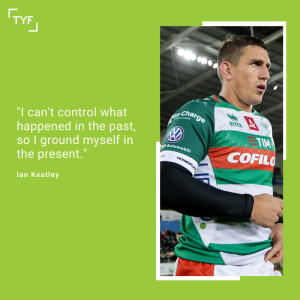News
Control the Controllables

We asked Mark Smyth, the 50th President of the Psychological Society of Ireland, and Niamh Fitzpatrick, an accredited Sports Pyschologist, for their thoughts on how to deal with anxiety during the Covid-19 crisis.
At the start of the year we would never have believed it possible. Had someone told us that by the time the clocks spring forward and winter was banished for another year, that instead of enjoying the brighter days we would be asked as a nation to stay in our homes in a bid to slow the spread of a virus, we might have laughed it off.
If they described news bulletins detailing a pandemic that has swept the globe, leaving unspeakable images and horrifying stories of trauma and loss, it would have made us believe that we were listening to the script of the next big Hollywood blockbuster. We might have even thought that the plot was a bit far-fetched: just essential workers are permitted to leave their homes for work while the rest of us can only venture outdoors for food, medical supplies, limited physical exercise or to care for the elderly cocooning in their homes.

But in April 2020 we find ourselves in the very middle of that Hollywood blockbuster. We are living that far-fetched existence. Life as we know it has changed beyond recognition and the truth is that right now, we don’t know for how long. The sort of life we will return to when we emerge on other side remains a mystery. These are uncertain times and living under the shadow of the unknown can open the door and allow sufficient space for anxiety and fear to sneak in.
Some people have fears about their own health or that of their loved ones. Others have worries about losing their job and paying their bills. More are performing their job in a new environment in working from home, operating remotely from colleagues or constantly in the presence of housemates. Childcare has been incorporated into office hours. Will being out of the school system for an extended period have an impact on them both socially and academically?
Sport is a massive part of many people’s lives. Around the world, those young and old will be missing the freedom of exercise as they struggle to adapt to a new life of confinement and restriction. They are missing the ability to train and compete, the companionship of team-mates, the familiar routine of having somewhere to go and having a purpose for going there. Their outlet to let off steam has been fastened.
It is safe to say that there are multiple reasons for feeling anxious now and there are fewer of our usual coping strategies available to us. So, what can we do if anxiety rears its head?
Name It
In order to tackle our feelings, we must first name and then accept them. It is important to remind yourself that anxiety is understandable at this time and so if you feel worried or fearful, tell yourself that this is anxiety. It is not a reflection on you as a person but is an indication of the times in which we are living. Naming and accepting your feelings will remove any unnecessary additional layer of shame – I’m feeling really anxious, what’s wrong with me? Feelings of anxiety may not be pleasant, but they are normal when the body’s threat system is activated. There’s nothing wrong with you if those feelings are there.
Look after the Basics
Now is a vital time to take care of your body so that it can take care of you. No matter how you’re feeling, turn towards the four pillars of wellbeing and ensure that each is addressed: sleep, social, food, exercise.
It can be tempting to stay up later at night, stay in bed that little bit later each morning. Occasionally that’s ok. But it’s important to to maintain a sleep pattern and amount of sleep similar to pre-Covid19 era where we can. Managing our anxiety takes energy, especially given how long this crisis has gone on for. So, prioritise your sleep.
We also get energy for coping from food. There’s a temptation to regularly hit the high sugar foods, caffeine or alcohol during periods of isolation to pass the time or get an instant sugar rush. High sugar, caffeine and alcohol can increase feelings of anxiety, so just be mindful of how much you might be consuming and how it impacts on your emotions.
We have long known that exercise can improve our mood and is a great way to reduce stress and improve our wellbeing. We’re limited by the radius in which we can exercise but we’re not limited in the ways we can exercise within that radius. Zoom exercise classes, home gym programmes, circuit stations in our garden or sitting room. Try when you can to find time each day to plan what exercise you’ll get.

Mandatory Credit ©INPHO/Laszlo Geczo
Being physically distant from others doesn’t mean that we have to be emotionally distant; we can still be social. This crisis has demonstrated how people can adapt when needed. People of all ages are using technology in new and creative ways to keep in touch with friends, family and loved ones. Set up a regular zoom coffee morning, a weekly chat with grandparents, a virtual play date, the possibilities are endless.
Identify Specific Worries
It’s legitimate to be worried about your health. It’s also legitimate to be worried about being cooped up in your home with the whole family 24/7. We all have our worries. In order to address anxiety, you need first to identify what particular aspect of the current situation provokes anxiety for you.
Identify a Plan for each Worry
Control the controllables. Do not let what is outside of your influence distract from what is within your control. If you’re worried about your health for example, take a breath, take a step back, and take a look at what you can do to mind your state of health: wash your hands, don’t touch your face, stay at home, physically distance from others when you do have to go out, cleanse and sanitize when you come home, eat well, prioritise sleep and rest, get regular fresh air, stay hydrated, adopt a new daily routine. Engaging in a robust plan of action reduces the likelihood of that worry becoming reality and brings anxiety to a more tolerable level.
Having a plan is about adapting and meeting your needs in different ways. If for example, you’re missing sport and feeling anxious about not having your regular training sessions, can you use the enforced time away from formal training to focus on some individual goals and develop aspects of your game that you usually don’t get time to work on? If you’re struggling because sport has a high social value for you and you miss the camaraderie with your team-mates, can your team do your individual training sessions and share how you got on via Zoom chats? During these sessions you might slip into general chat rather than training chat and that’s ok, it’s about meeting that connection need.
Stay in the Present
When we feel anxious, in our mind we go to the future, giving oxygen to thoughts and images of scenarios that might happen. What if my parents get sick? What if I lose my job? What if it gets too much with us all being cooped up here? Once you have done your trouble-shooting and you have a strong plan of action for each worry you’ve identified, escort your mind back to the present whenever it wanders towards the ‘what if?’ scenarios. Get busy with a task that occupies you both physically and mentally, immersing yourself in the present moment. This of course, won’t banish Covid-19 but it will make for a nicer place inside your head when you focus on helping yourself in these tough times. Exercise can be particularly useful as an activity to immerse yourself in, as can calling a friend.

Call on the Past
This situation may be one that is different to any that we have known before, but it is highly unlikely that you have gotten this far in life without encountering tough times along the way. It’s important to remind yourself that you managed to survive every one those challenges. It’s also important to revisit the strategies you utilised to get through them, as well as the ways in which you developed as a person through surviving those hard times.
Be Realistic
Perhaps your worries are around pressure to deliver your usual standard of performance in work or even in terms of parenting routines. Do you think that it’s realistic to expect the exact same standards when the conditions under which you are performing are completely different? Or is it even realistic to expect that you will do better, improving yourself by learning a new language or writing a book? Not at all. At the moment, life is not about thriving, it’s about surviving; so be sure to avoid putting unnecessary pressure on yourself, by being realistic and reasonable in what you ask of yourself and indeed of others.
When we focus on the things that we can control, rather than those that are outside of our control, we can help manage anxiety. We are currently living in unprecedented times. You have legitimate reasons to feel anxious. Just be aware of these feelings rather than pushing them away. Don’t ignore them but take control and address them.
The Tackle Your Feelings app and website provides you with the tools to help deal with the things mentioned in this article and put into practice some of the suggestions given. Stay connected with those you care about, support one another and be kind to yourself.
Mark Smyth

Mandatory Credit ©INPHO/James Crombie
Mark Smyth is the 50th President of the Psychological Society of Ireland. He is also a Chartered Senior Clinical Psychologist with a Child & Adolescent Mental Health Service. Mark has spent 17 years specialising in working with young people with mental health difficulties, young people in the care of the state and juvenile detention centres in the areas of anxiety, self-harm and suicide.
He has a deep interest in the psychology of social media, politics & policing. Mark is a member of the PSI Communications and Events group and is a frequent contributor in the media on mental health and psychology matters. You can find out more about Mark’s work at his blog: https://wanderingmindofapsychologist.com/blog-feed/ or you’ll find him most often on twitter @psychpolis
Niamh Fitzpatrick

A member of Psychological Society of Ireland and an accredited Sport Psychologist with Sport Ireland Institute, Niamh has degrees in Psychology, Clinical Psychology, and Sport Psychology. With 29 years in private practice under her belt, her work focuses on two main areas: Optimum mental health, and Optimum performance.
In the sporting arena, Niamh has been the psychologist with All Ireland winning GAA teams at both Senior & Minor level. She was appointed as HQ Psychologist to the Irish Olympic Team for the Olympic Games in Athens (2004), Beijing (2008) and London (2012).
On the mental health platform, her practice she sees clients referred by GPs and other health professionals. She was also the Agony Aunt on Today FM radio from 2011-2018, working on the Ray D’Arcy, Anton Savage, and Neil Delamere shows, getting information about mental health out to a wider audience. She is also a regular keynote speaker at a wide range of mental health events.
Back to NewsLatest Posts

Player Development Programme Review

Finding Hope

Highlights: February 2025
















